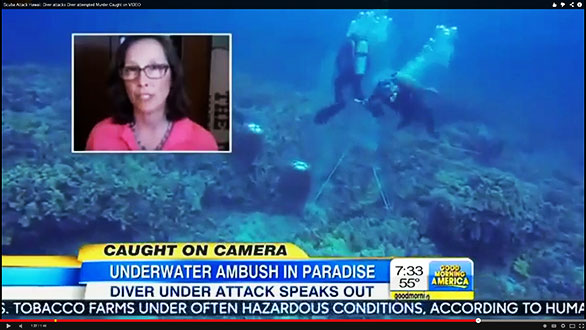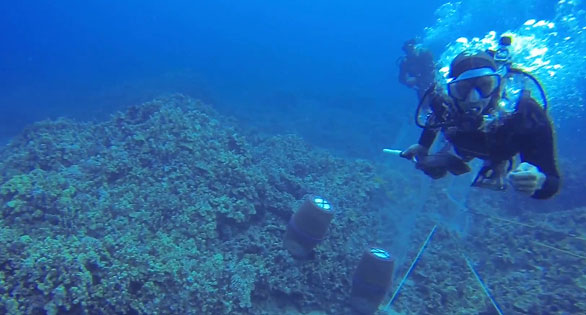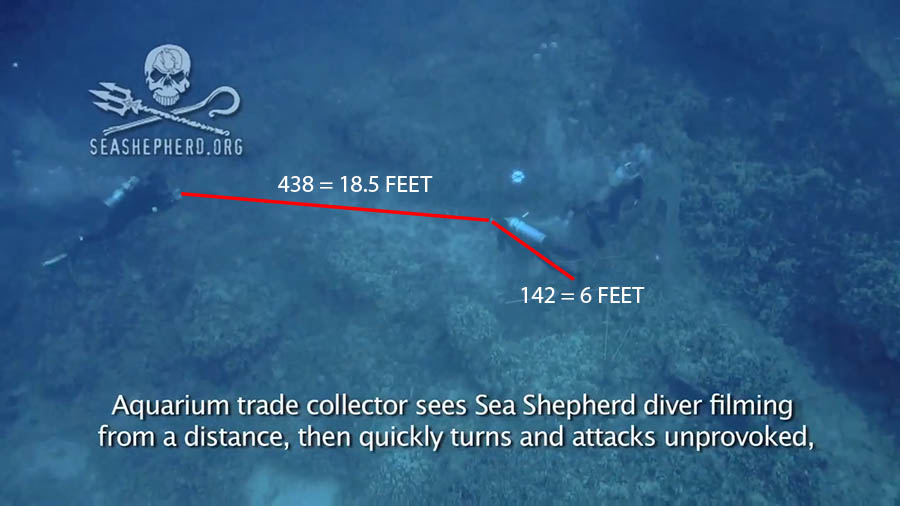
Hawaii’s aquarium fishing controversies became national news last year when anti-fishing activist Rene Umberger says she was attacked by diver Jay Lovell who was legally collecting Yellow Tangs. Screen image from CBS Good Morning America.
Special to CORAL Magazine
Commercial fisherman Jay Lovell pled no contest last week to charges brought against him based on the most public altercation between aquarium fishers and anti-aquarium trade activists in years in Hawaii’s contentious aquarium fishery.
The event took place on a West Hawaii reef last spring, when Lovell, who was fishing at the time, was videotaped charging anti-aquarium trade activist Rene Umberger and knocking the regulator from her mouth at a depth of roughly 50 feet (16 meters). Umberger, who is the founder of For the Fishes, was acting in association with the Sea Shepherd Conservation Society as part of Operation Reef Defense when the incident occurred. In addition to Umberger, there were five other Sea Shepherd divers in the water, as well as Lovell’s fishing partner. Umberger, who is also reportedly a coral reef consultant for Humane Society International, recovered her regulator and left the scene unharmed but severely upset.

Aquarium fisherman Jay Lovell being sentenced in a Hawaiian court for an underwater attack on in what he said was a move to protect himself. Image: Screen shot from Big Island Video News. Click to expand. See Sources below to view full view report.
As part of a plea agreement, Lovell received a deferred six-month prison sentence on the charge of second-degree “terroristic threatening.” If he remains in good standing with the court for one year, Lovell will not serve any jail time, and the incident will be expunged from his record. In addition to the deferred prison sentence, Lovell must undergo an anger management assessment.
Charges of harassment were never brought against Umberger or any of the other Sea Shepherd divers, although Lovell and his fishing partner believed at the time such charges were warranted. Aquarium fishers claim they are commonly harassed by anti-aquarium trade activist, who approach fishers underwater and make harvest difficult if not impossible. For their part, the anti-trade activists say they are monitoring and documenting fishing activity without the intent to harass.
A Tense Situation
During the incident last May, Lovell claimed he felt threatened by the Sea Shepherd divers. Lovell has told the press that he was alarmed to see a group of divers approaching and surrounding him while bearing GoPro cameras mounted on spear-like rods.According to other aquarium fishers fishing in West Hawaii, Lovell was not alone.
Sea Shepherd has a reputation of using extreme tactics when combating illegal fishing, and some feared those tactics would be employed in Hawaii, despite the fact that aquarium fishing is legal and the State’s own data show that the fishery is sustainable and not “decimating reef fish populations” as Sea Shepherd has claimed. In the weeks leading up the incident, the tension between anti-aquarium trade activists and aquarium fishers was palpable. Following Sea Shepherd’s launch of Operation Reef Defense in Hawaii, Umberger reportedly said “[W]e’re going to sic Sea Shepherd on them,” in response to a question about what concerned citizens should do if they observe illegal aquarium fishing activity. The comment was made following a June 2013 talk in Kona titled “Full Tanks & Empty Reefs; The Impacts of Hawaii’s Reef Wildlife Trade.”
While Lovell and his partner may have felt threatened last May, there is no evidence to suggest the aquarium fishers were in actual danger. Whether Lovell’s actions appear to have been a self-defensive attempt to diffuse what he felt was a potentially dangerous situation or whether it was just an angry response to perceived ongoing harassment, the act of stripping another diver of her air supply underwater has been widely condemned in the court of public opinion after video of the incident went viral.
During Lovell’s court appearance last week, the judge told Lovell he was lucky he wasn’t facing a more serious charge.

Jay Lovell rushing at Rene Umberger at about 50-feet below the surface. Image by Rene Umberger, For the Fishes.Lovell’s lawyer, Marcus Landsberg IV, said he was pleased with the outcome. “Jay is punished functionally for whatever wrong he did, and he’s not over punished,” said Landsberg. “It’s not overkill based on something he didn’t do, or was accused of or something that was made up…which is really what our fear was going into this case—that he would be over punished.”
Directly after the incident, Umberger and others had said they believed Lovell should be charged with attempted murder.
House Bill 511
While Lovell and his partner may not have been in any immediate danger from the Sea Shepherd divers, there is little doubt that the presence of the anti-aquarium activists affected fishing. In an interview with CORAL Magazine last spring, Sea Shepherd founding head Paul Watson said his organization was on the ground and in the water in Hawaii to “investigate” the aquarium trade and allegations of illegal activity.
While Watson says he doesn’t know if there was illegal activity occurring or not, he maintains Sea Shepherd was not harassing fishermen or intervening in any way. “We’re not a protest organization,” Watson told CORAL. “We don’t actually intervene unless it’s illegal. So I think that what you’re seeing [in Hawaii] is an investigation, but there wasn’t any intervention…. We’re not going to be interfering with any legal fishing operation.”

Based on informal, amateur analysis of video footage released by Sea Shepard, CORAL Magazine Senior Editor Matt Pedersen believes Umberger may have approached to within an estimated 18.5 feet of the fishermen. Umberger continues to drift towards them by the time Lovell reacts and rushes at Umberger.
Aquarium fishers claim, however, that such documentation of a legally permitted activity amounts to harassment. They argue anyone filming or observing their fishing activity at the distance at which Umberger was when the incident occurred last may is harassment because it interferes with their “legal, permitted livelihood.” In at least one prior attempt to bring charges of harassment against an anti-trade activist, the charges were dropped because, according to state law, there is no regulation in place specifically against harassment of a fisher in the marine environment. While there is a provision for bringing harassment charges against an individual interfering with freshwater fishing, at this time, marine fishers have no such explicit protection. “There are still ways charges may be brought,” said a source well-versed in state law, “but it’s not as cut and dry as if a similar thing happened in freshwater.”
Aquarium fishers brought this concern to their local state representative Cindy Evans. As a result, House Bill 511 is now progressing through the State Legislature. HB 511 prohibits the harassment of persons marine fishing and aquarium fishing. The Bill also specifically addresses the enforcement of harassment “as a duty of a conservation and resources enforcement officer.” Recently the Bill passed out of the House Committee on Ocean, Marine Resources and Hawaiian Affairs on Thursday 12 February.
A Legal Fishery with Data Showing Sustainability
Hawaii’s aquarium fishery is the State’s most valuable inshore fishery, and, according to the Hawaii Department of Land and Natural Resources (DLNR), the fishery is a sustainable one. While aquarium fishery critics contend the harvest of reef fishes for aquaria has devastated Hawaii’s reefs, the data tell a different story. Because of fisheries management measures put in place in the late 1990s, the State’s largest aquarium fishery in West Hawaii has seen yellow tang abundance in the 30’-60’ depth range increase by 1.3 million fish (58%) from 1999 to 2013. The current population across all areas is estimated to be 3.6 million fish. Fisheries managers and biologists credit the success of the fishery to a network of so-called fishery replenishment areas (FRAs) and marine protected areas (MPAs), as well as an innovative multi-stakeholder, community approach to fisheries management.
SOURCES
Image from Hawaiian Courtroom: Copyright © Big Island Video News.

